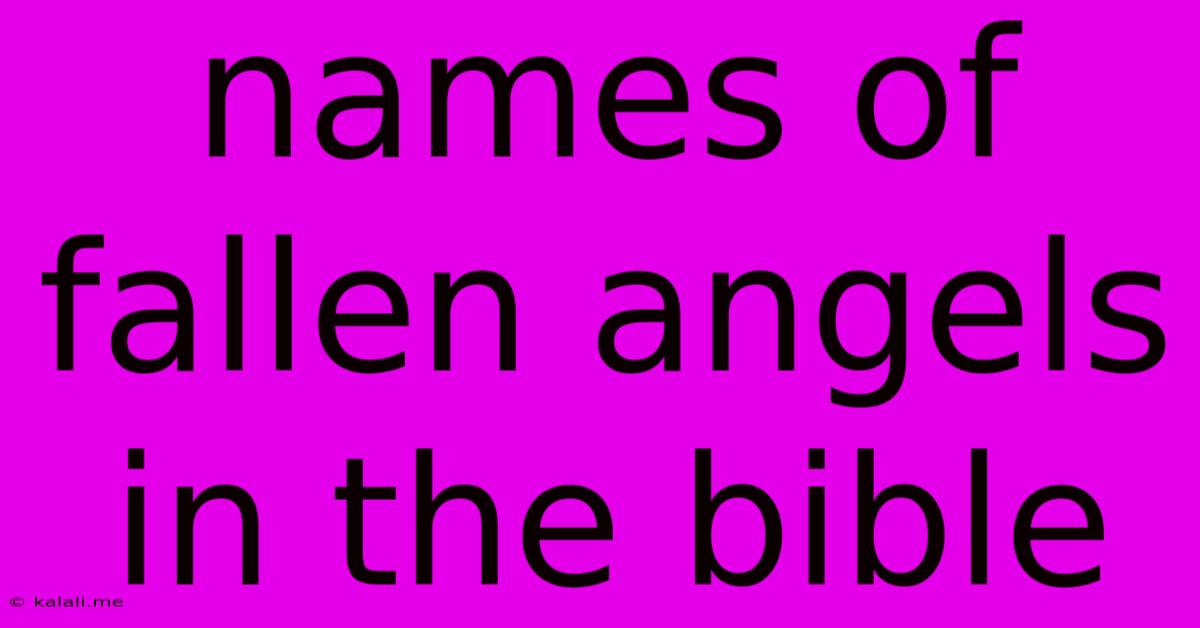Names Of Fallen Angels In The Bible
Kalali
May 23, 2025 · 3 min read

Table of Contents
Names of Fallen Angels in the Bible: Exploring the Biblical Accounts
The Bible doesn't offer an exhaustive list of fallen angels, leaving room for interpretation and debate among theologians and biblical scholars. While specific names are scarce, the scriptures allude to a significant rebellion in Heaven, leading to the expulsion of a considerable number of angelic beings. This article delves into the limited biblical references to named fallen angels, examining the context and exploring the broader implications of their fall. Understanding this topic requires careful consideration of scriptural interpretations and acknowledges the diverse perspectives surrounding it.
The Notable Mention: Lucifer/Satan
The most prominent fallen angel, undeniably, is Lucifer, a name often associated with Satan. While "Lucifer" appears only once in the Bible (Isaiah 14:12), it's widely interpreted as a reference to the king of Babylon's downfall and metaphorically applied to Satan's fall from grace. The Bible depicts Satan as the adversary, the deceiver, the accuser, and the prince of darkness. His role is central to narratives of temptation, rebellion, and spiritual warfare. The term "Satan," meaning "adversary," describes his function more than his identity before the fall.
Beyond Lucifer: Interpretations and Speculation
The Bible does not provide a comprehensive roster of other fallen angels by name. Many names associated with fallen angels originate from extra-biblical sources like the apocryphal books and later theological interpretations. These texts, while sometimes offering rich narratives, are not considered canonical scripture by most Christian denominations.
The Book of Revelation and Demonic Entities:
The Book of Revelation features demonic entities, often described with symbolic language and titles rather than proper names. These figures are powerful agents of evil, working alongside Satan to oppose God's will. While not explicitly named as "fallen angels," their actions and descriptions suggest a connection to the celestial rebellion. Examples include:
- The Beast: A powerful, symbolic figure representing evil and tyranny.
- The False Prophet: A deceptive figure who performs miracles and deceives humanity.
Understanding the Absence of Names:
The scarcity of named fallen angels in the Bible might reflect a theological point. The focus isn't on individual angelic identities but on the overarching themes of rebellion, sin, and the power of God. Naming them could inadvertently elevate their significance or distract from the core message of God's ultimate victory over evil. The emphasis is on the spiritual battle and the consequences of choosing to follow Satan rather than God.
The Broader Theological Significance:
The narrative of fallen angels serves as a powerful reminder of the consequences of rebellion against God and the importance of faithfulness. It underlines the spiritual war between good and evil and highlights God's ultimate sovereignty and power. The story of the fallen angels, while lacking extensive details about individual names, remains a significant theme in theological discourse and spiritual understanding.
Conclusion:
While the Bible directly names only Lucifer/Satan as a fallen angel, it’s clear that a significant number rebelled. The lack of further named entities doesn't diminish the importance of the narrative itself. The story highlights the cosmic conflict between good and evil, serving as a powerful metaphor for the ongoing struggle within humanity's hearts and the world at large. The focus remains firmly on the ultimate triumph of God and the importance of choosing His path.
Latest Posts
Latest Posts
-
You Dont Have A Say Meaning
May 24, 2025
-
Hillshade Color Contour In Dep Qgis
May 24, 2025
-
Mysql Cli Output To Shell Variable
May 24, 2025
-
How To Get Somones Ip Adress Instagram
May 24, 2025
-
Why 40 Year Difference In Jewish King Timeline Jw Net
May 24, 2025
Related Post
Thank you for visiting our website which covers about Names Of Fallen Angels In The Bible . We hope the information provided has been useful to you. Feel free to contact us if you have any questions or need further assistance. See you next time and don't miss to bookmark.